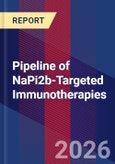NaPi2b, encoded by the SLC34A2 gene, is a cell surface multi-transmembrane, sodium-dependent phosphate transporter with an antibody-accessible extracellular loop, that regulates sodium-dependent phosphate homeostasis. Functionally, it is involved in trans-cellular flux of phosphate in the small intestine and in the synthesis of surfactant in lung alveoli. NaPi2b is reported to be expressed at a high frequency in ovarian carcinoma as well as in NSCLC, bladder, endometrial and papillary thyroid carcinoma, and its expression is associated with poor prognosis. NaPi2b is highly expressed in certain cancers, e.g. in 75 to 90% of both non-squamous NSCLC and epithelial ovarian cancer, but with limited expression in normal tissues, making it a promising target for antibody-drug conjugates (ADCs).
Development of first-generation NaPi2b-targeted ADCs using auristatin as payload (upifitamab rilsodotin, lifastuzumab vedotin) was discontinued opening the way for next generation safer and more effective ADCs.








